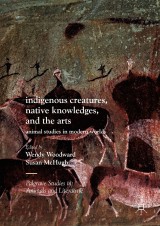Details

Indigenous Creatures, Native Knowledges, and the Arts
Animal Studies in Modern WorldsPalgrave Studies in Animals and Literature
|
106,99 € |
|
| Verlag: | Palgrave Macmillan |
| Format: | |
| Veröffentl.: | 17.10.2017 |
| ISBN/EAN: | 9783319568744 |
| Sprache: | englisch |
Dieses eBook enthält ein Wasserzeichen.
Beschreibungen
<p>This volume illuminates how creative representations remain sites of ongoing struggles to engage with animals in indigenous epistemologies. Traditionally imagined in relation to spiritual realms and the occult, animals have always been more than primitive symbols of human relations. Whether as animist gods, familiars, conduits to ancestors, totems, talismans, or co-creators of multispecies cosmologies, animals act as vital players in the lives of cultures. From early days in colonial contact zones through contemporary expressions in art, film, and literature, the volume’s unique emphasis on Southern Africa and North America – historical loci of the greatest ranges of species and linguistic diversity – help to situate how indigenous knowledges of human-animal relations are being adapted to modern conditions of life shared across species lines.</p>
Editors’ introduction: <i>Wendy Woodward and Susan McHugh.- </i>Chapter 1 Qing and the animals of the Drakensberg-Maloti: <i>M</i><i>ichael Wessels.- </i>Chapter 2 //Kabbo sings the animals: <i>Dan Wylie.- </i>Chapter 3 Interrogating the sacred art of Vetkat Regopstaan Boesman Kruiper: <i>Richard Alan Northover.- </i>Chapter 4 Spirit guards: A squad of ceramic dogs in South Africa: <i>Nicolene Swanepoel.- </i>Chapter 5 Tricksters, animals, new materialities, and indigenous wisdoms: <i>Delphi Carstens.- </i>Chapter 6 The porosity of human/ nonhuman beings in Neil Gaiman’s <i>American Gods </i>and <i>Anansi Boys: </i><i>Alexandra Wheeler.- </i>Chapter 7 Animated animals: Allegories of transformation in <i>Khumba: </i><i>Hermann Wittenberg.- </i>Chapter 8 Magic wells, the stream, and the flow: The promise of literary animal studies: <i>Marion Copeland.- </i>Chapter 9 Border crossings: Animals, tricksters, and shape-shifters in modern Native American fiction: <i>Daniel G. Payne.- </i>Chapter 10 I'm mad you’re mad we are all mad: <i>The Alice Diaries</i>: <i>Wilma Cruise.- </i>Chapter 11 ‘The only facts are supernatural ones’: Dreaming animals and trauma in some contemporary Southern African texts: <i>Wendy Woodward.- </i>Chapter 12 Cross-pollinating: Indigenous Knowledges of Extinction and Genocide in Honeybee Fictions: <i>Susan McHugh.- </i>Index.
<div><p>Susan McHugh is the author of <i>Animal Stories: Narrating across Species Lines</i> (2011) as well as <i>Dog </i>(2004). She co-edited <i>The Routledge Handbook of Human-Animal Studies </i>(2014), and <i>Literary Animals Look</i>, a special issue of <i>Antennae: The Journal of Nature in Visual Culture</i> (2013). </p> <p>Wendy Woodward is the author of <i>The Animal Gaze: Animal Subjectivities in Southern African Narratives</i> (2008). She co-edited a special issue of <i>Journal of Literary Studies</i> entitled <i>Figuring the Animal in Post-apartheid South Africa</i> (2014) and has published three volumes of poetry.</p></div><div><br/></div>
‘Traditionally, important books concerning animals report scientific views. <i>Indigenous Creatures, Native Knowledge, and the</i> <i>Arts</i> is an important book concerning animals that reports artistic views held by a wide array of people from a variety of cultures. Considering that art was the method used by the earliest members of our species to represent animals, this says a great deal about us and our biophilic views. It’s fascinating, and no wonder, as we all have some desire to connect with other species, and we can rely on this book, which is written with scholarly care.’ <div>— <b>Elizabeth Marshall Thomas, </b>author of <i>The Harmless People</i>, <i>The Hidden Life of Dogs</i>,<i> </i>and <i>The Animal Wife</i>, USA<p></p></div><div>This volume illuminates how creative representations remain sites of ongoing struggles to engage with animals in indigenous epistemologies. Traditionally imagined in relation to spiritual realms and the occult, animals have always been more than primitive symbols of human relations. Whether as animist gods, familiars, conduits to ancestors, totems, talismans, or co-creators of multispecies cosmologies, animals act as vital players in the lives of cultures. From early days in colonial contact zones through contemporary expressions in art, film, and literature, the volume’s unique emphasis on Southern Africa and North America – historical loci of the greatest ranges of species and linguistic diversity – help to situate how indigenous knowledges of human-animal relations are being adapted to modern conditions of life shared across species lines.<br/></div><div><br/></div><div><p>Wendy Woodward is the author of <i>The Animal Gaze: Animal Subjectivities in Southern African Narratives</i> (2008). She co-edited a special issue of <i>Journal of Literary Studies</i> entitled <i>Figuring the Animal in Post-apartheid South Africa</i> (2014) and has published three volumes of poetry.</p><p>Susan McHugh is the author of <i>Animal Stories: Narrating across Species Lines</i> (2011) as well as <i>Dog </i>(2004). She co-edited <i>The Routledge Handbook of Human-Animal Studies </i>(2014), and <i>Literary Animals Look</i>, a special issue of <i>Antennae: The Journal of Nature in Visual Culture</i> (2013).<br/></p></div>
Interdisciplinary - brings together work from a range of creative areas such as art history and literature Features examples from the nineteenth through the twenty-first centuries Explores the roots of the struggle in colonial contact zones, where the stakes include conceptual as much as physical survival Includes supplementary material: sn.pub/extras
Interdisciplinary - brings together work from a range of creative areas such as art history and literature<div><br/><div>Features examples from the nineteenth through the twenty-first centuries</div><div><br/>Explores the roots of the struggle in colonial contact zones, where the stakes include conceptual as much as physical survival</div></div>
“Traditionally, important books concerning animals report scientific views. <i>Indigenous Creatures, Native Knowledge, and the</i> <i>Arts</i> is an important book concerning animals that reports artistic views held by a wide array of people from a variety of cultures. Considering that art was the method used by the earliest members of our species to represent animals, this says a great deal about us and our biophilic views. It’s fascinating, and no wonder, as we all have some desire to connect with other species, and we can rely on this book, which is written with scholarly care.” (Elizabeth Marshall Thomas, author of The Harmless People, The Hidden Life of Dogs, and The Animal Wife, USA)<p></p>
Diese Produkte könnten Sie auch interessieren:

The Enigma of Good and Evil: The Moral Sentiment in Literature

von: Anna-Teresa Tymieniecka

309,23 €















